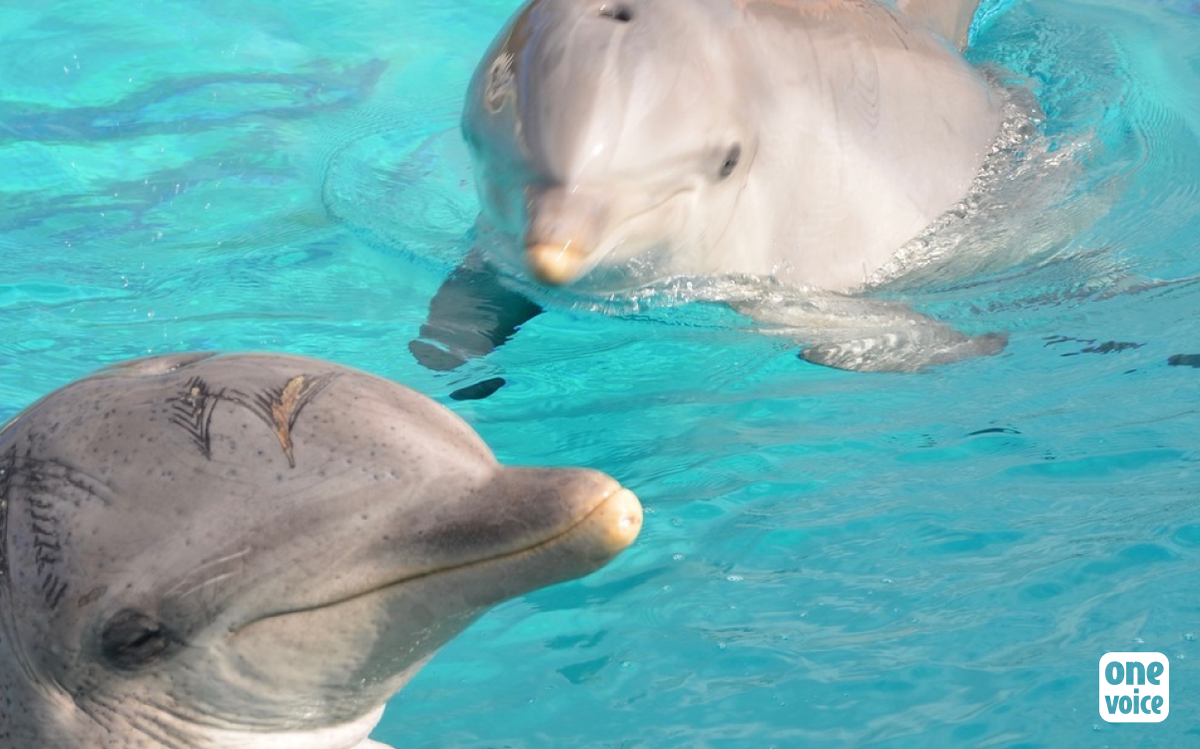

Fight the dolphinarium decree!
The statute which One Voice has been opposing since last September is in the process of being accepted. But there is still time to influence: a public consultation is open until the 1st of March. Get involved to stop it being passed!
Latest news
When the consultation was closed, there were no less than 4,500 pages of comments opposed to the draft statute on the Minister of the Environment’s website!
This is a great response which must be heard.
No – A 35 year old statute cannot be adapted. No – The cetaceans must accept a life in captivity where they keep dying, one after the other. A prison, whatever its size, remains a prison.
One Voice, supported by the European coalition Dolphinaria-Free Europe, is firmly opposed to the statute which is being prepared for voting. Since September, the association has intensified its activity directed at the minister, to stop France from becoming a
dolphin breeding farm.
The few modifications that have been integrated into the statute are just a means of allowing for their activity to continue whilst everything proves that it is time to put an end to this!
The famous Doctor Naomi Rose, a cetacean specialist known in particular for her appearance in Blackfish, confirms this:
“It is of course useful that campaigners communicate with the authorities regarding the legal framework on captivity to make it respected, if not to strengthen it, to improve cetacean well-being. But any new legislation should have abolition as its only objective, either immediately or in phases. These small legal steps forward are too time-consuming, deferring the day when these deeply cruel practices are finally banned. As for an exchange with marine circuses, this is recommended. This industry prevails every time with a kind of “greenwashing”.”
For his part, the French veterinarian, Pierre Gallego, cetacean specialist and President of Odyssea, reminds us that
“it is well known, in the cetacean veterinary world as well as in specialised scientific literature, that bottlenose dolphins in captivity can be exposed to high levels of stress (…) aggressive behaviour between fellow dolphins is not rare. This is exacerbated by the fact that the dolphins live in a confined space and they cannot avoid aggressive behaviour by simply fleeing, which would be the case in their natural environment.”
This statute is nonsense. It does not take into account the well-being of animals, as well as the French people’s inclination, of which 54% are in favour of banning dolphin and orca shows (survey conducted by IPSOS/One Voice in December 2016). The international context is also not considered; several countries have already banned these shows, or taken measures in this direction, complying with the
Helsinki Declaration. In addition, there is the situation in France today, where several cetaceans have died since 2015, including Aicko, a death which was questionable enough that the Tribunal of Nantes accepted our application and have asked for the mandate of an expert to determine the cause of death!
One Voice is not ruling out taking on a Council of State lawyer to cancel the statute if it is adopted, but right now is the time for citizen mobilisation. Support our action by addressing your comments for the public consultation which is open up until the 1st of March.
Here are some arguments which you can use by copying and pasting them in the comments section:
- Cetaceans are sentient beings with particularly developed cognitive capacities. India has already given them animal person status, as is advocated in the Helsinki declaration, as adopted by 50 international scientists since 2010, and which stipulates that “all cetaceans as persons have the right to life, liberty and wellbeing.”
- In their wild state, cetaceans can swim up to 160 kilometres per day and dive to depths of 60 metres. As a comparison, the space which they have in captivity represents less than 1% of what they can experience in nature (Perrin et al., 2009)
- The facilities which contain them are not able to recreate the richness of their natural environment. Most pools are small, with smooth sides and exempt from any stimulus (Couquiaud, 2005). It is regularly observed that large carnivorous wild fauna which do not have sufficient space develop behavioural problems such as repeated stereotypical behaviours (Clubb & Mason, 2003).
- To mix unrelated cetaceans that sometimes come from different regions and different species can interfere with the group dynamic and can lead to dominance related attacks, injuries and illness, sometimes leading to individual death (Waples & Gales, 2002). In captivity, cetaceans cannot flee to avoid aggressive behaviour.
- The transfer of individuals between the dolphinariums modifies the social links and the fragile balance between groups, and beyond that creates risks for the well-being of all group members, ingoing and outgoing.